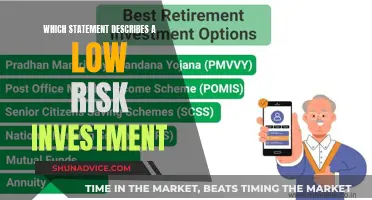
Private equity is a form of investment that takes place outside of the public stock market. It allows investors to gain an ownership stake in private companies. Private equity funds are generally made up of investors who supply the capital, the private equity firm that manages and invests that money, and the companies the private equity firm invests in. Private equity investing is not easily accessible for the average investor, as it often requires a minimum investment of $25 million, although some firms have dropped their minimums to $250,000 or even $25,000. There are a few non-direct ways to invest in private equity, including funds of funds, ETFs through brokerage platforms, and special purpose acquisition companies (SPACs).
| Characteristics | Values |
|---|---|
| Minimum Investment Requirement | Typically $25 million, but can be as low as $250,000 or even $25,000 |
| Type of Investor | Institutional investors and wealthy individuals, including large university endowments, pension plans, and family offices |
| Investment Types | Funds of funds, ETFs through brokerage platforms, and special purposes acquisition companies (SPACs) |
| Investment Period | Investors should plan to hold their investment for at least 10 years |
| Returns | Historically, private equity has outperformed public markets across time horizons |
| Risks | Very speculative and risky, with no guarantee of success and few protections for investors if companies fail |
| Fees | Higher fees than conventional investments, which can reduce returns |
| Due Diligence | In-depth due diligence is critical to meeting investment objectives |
| Market | The number of public companies is shrinking, highlighting the need to diversify |
What You'll Learn

Minimum investment requirements
Private equity investments are high-risk and illiquid, and the minimum investment requirements are often very high. The standard minimum investment amount is $25 million, but some firms have lowered their minimums to $250,000 or even as low as $25,000.
In addition to meeting the minimum investment requirements, investors must also be accredited, with a net worth of over $1 million or an annual income of more than $200,000 in the last two years.
There are a few non-direct ways to invest in private equity with lower minimum investments. One option is to invest in a fund of funds, which holds shares of many private partnerships that invest in private equities. The minimum investment for these funds can range from $100,000 to $250,000. Another option is to purchase shares of an exchange-traded fund (ETF) that tracks an index of publicly traded companies investing in private equities. There are also private equity exchange-traded funds (ETFs) that offer exposure to publicly listed private equity companies. These funds typically do not have minimum investment requirements.
It is important to note that private equity investments are not suitable for everyone and there is a risk of losing all the money invested.
Investing in India: A Beginner's Guide to Getting Started
You may want to see also

Non-direct ways to invest
Private equity is a form of investment that occurs outside of the public stock market, allowing investors to gain an ownership stake in private companies. The funds raised might be used for developing new products and technologies, expanding working capital, making acquisitions, or strengthening a company's balance sheet. Due to the high minimum investment requirements, typically ranging from a few hundred thousand to several million dollars, most private equity investing is reserved for institutional investors or high-net-worth individuals.
- Funds of funds: These hold the shares of many private partnerships that invest in private equities, allowing firms to increase cost-effectiveness and reduce their minimum investment requirement. This approach can also offer greater diversification and potentially lower risk compared to individual private equity investments. However, there is an additional layer of fees paid to the fund manager, and minimum investments can be in the $100,000 to $250,000 range.
- Exchange-Traded Funds (ETFs): You can purchase shares of an ETF that tracks an index of publicly traded companies investing in private equities. There are no minimum investment requirements when buying individual shares over the stock exchange. However, ETFs also add an extra layer of management expenses, and brokerage fees may apply depending on your brokerage platform.
- Special Purpose Acquisition Companies (SPACs): These are publicly traded shell companies that make private equity investments in undervalued private companies. However, SPACs can be risky due to a lack of diversification and potential pressure to meet investment deadlines.
- Crowdfunding: The JOBS Act of 2012 partially opened the door for non-accredited investors to participate in private equity through crowdfunding platforms. These platforms allow individuals to make relatively modest investments in small, early-stage companies and spread their risk across multiple investments. There are limits on how much non-accredited investors can invest through crowdfunding, depending on their income and net worth.
- Publicly-traded private equity firms: Individuals can invest in publicly-traded private equity firms, such as Apollo Global Management (APO), The Blackstone Group (BX), and KKR. As a shareholder, you benefit from the firm's expertise in selecting target companies, and you don't need to commit large amounts of capital. However, investing in individual stocks can be risky due to a lack of diversification.
Invest Safely in India: A Guide to Smart Investing
You may want to see also

Private equity vs public market returns
Private equity has long been an attractive investment option for high-net-worth individuals and institutional investors due to its potential for high returns. However, the recent convergence of returns from private and public equity has raised questions about its future performance.
Private Equity Returns vs Public Market Returns
Private equity funds are pools of raised or borrowed funds used to obtain equity ownership in smaller companies with growth potential. Private equity firms attract investors by promising greater returns than other investment options.
From 2000 to 2020, private equity outperformed the Russell 2000, the S&P 500, and venture capital. The U.S. Private Equity Index showed an average annual return of 10.48% over this 20-year period, compared to 6.69% for the Russell 2000 Index and 5.91% for the S&P 500.
However, when compared over different time frames, private equity returns may be less impressive. For example, from 2010 to 2020, venture capital outperformed private equity with an average annual return of 15.15%. Additionally, the S&P 500 slightly edged out private equity with a performance of 13.99% compared to 13.77% for private equity in the 10 years ending on June 30, 2020.
It's important to note that returns in private equity are measured differently than in public markets. Private equity returns are based on Internal Rate of Return (IRR), which considers actual cash distribution to investors, while public market securities are valued daily. The subjective nature of private equity valuations can lead to "smoothing," where valuations are overstated in bad times and understated in good times.
Factors Affecting Returns
The performance of private equity is influenced by various factors, including the expertise and focus of the private equity firm. Top-performing firms consistently outperform by specialising in specific sectors or geographic regions, allowing them to assess risks and opportunities better than their competitors.
Additionally, the level of competition in the industry plays a role. As more investors allocate larger portions of their portfolios to private equity, attractive investment opportunities become scarcer, driving up average purchase prices and making it more challenging to generate high returns.
Risks and Drawbacks
Private equity investing carries a high degree of risk and requires substantial capital, with minimum investments typically ranging from $250,000 to $25 million. It also demands a long-term commitment, with investors often needing to hold their investments for at least ten years.
Private equity firms may face challenges in locating excellent investment opportunities as the market becomes more accessible to a broader range of investors. Additionally, the lack of public scrutiny and varying levels of transparency in privately-held companies can introduce higher risk levels.
While private equity has historically outperformed public markets, the narrowing gap in returns and the dynamic nature of the investment landscape make it crucial for investors to carefully assess their options and consider the potential risks and rewards before committing their capital.
Lucrative Investment Zones Across India
You may want to see also

Limited partnerships
When you invest in a private equity fund, you become a limited partner. As a limited partner, you are a secondary investor, supplying the capital that makes the investment possible, but you have no management responsibilities. The private equity firm manages the investment and makes any necessary improvements. Limited partners are only liable up to the amount they invest in the fund, and they get a return on their investment when the firm sells the company it has purchased. Typically, the firm will take about 20% of the profits, and the rest is split among the limited partners based on how much they contributed to the fund.
Limited partners are liable for up to the money they invest, while general partners are fully liable to the market. The level of risk to each partner is outlined in a limited partnership agreement (LPA), which all institutional and individual investors must agree to. The LPA also outlines the fund's management fees and return on investment.
Investing in Indian Startups: Pre-IPO Opportunities
You may want to see also

Risks of private equity
Private equity investments are known for their high returns, but they also carry a higher degree of risk than other asset classes. Here are some of the key risks associated with private equity:
Liquidity Risk
Private equity investors are expected to commit their funds to the firm for a long period, typically between four and ten years. This lack of liquidity means that investors cannot easily sell their investment if they need to. In contrast, investors in stocks, mutual funds, or exchange-traded funds (ETFs) can usually sell their holdings on the same day if needed.
Market Risk
Many private equity investments are in unproven, early-stage companies, particularly in sectors such as software, healthcare, and biotechnology. These companies are inherently risky, and there is a high chance of failure. Only a small percentage of these companies will achieve significant returns, and even a successful company can be negatively impacted by factors such as an ineffective management team or a failed product launch.
Operational Risk
This refers to the risk of loss due to inadequate processes and systems within the organisation. It is a key consideration for investors, as it can impact the overall performance of the fund.
Funding Risk
Funding risk is closely related to liquidity risk. If investors are unable to meet their funding commitments, they may be forced to sell illiquid assets at a loss to meet their obligations.
Capital Risk
Capital risk is the possibility of losing the original capital invested at the end of the fund's life. This can occur through the failure of underlying companies within the private equity portfolio or due to suppressed equity prices that make exits less attractive.
Investment-Related Risks
Private equity investments are often in sectors with specific risks, such as technology risk (will the technology work?), market risk (will a new market develop for this technology?), and company risk (can management develop a successful strategy?).
Overall, while private equity can offer high potential returns, it is a speculative and risky endeavour. Investors need to carefully consider these risks and ensure they have the necessary funds and risk tolerance before investing.
Investment Models in India: Understanding the Fundamentals
You may want to see also
Frequently asked questions
Private equity is a form of investment that takes place outside of the public stock market. Through private equity, investors gain an ownership stake in private companies.
Traditional private equity funds have very high minimum investment requirements, potentially ranging from a few hundred thousand to several million dollars. As such, most private equity investing is reserved for institutional investors or high-net-worth individuals.
Private equity investing involves three parties: investors who supply the capital, the private equity firm that manages and invests that money via a private equity fund, and the companies the private equity firm invests in.
Investors turn to private equity to diversify their holdings and aim for higher returns than the public market might provide. Private equity valuations are not influenced by the larger market, and while private equity funds are high-risk, they have historically resulted in higher returns.
To directly invest in private equity, you need to work with a private equity firm. You can also take part in private equity investments without going through a traditional firm through private equity exchange-traded funds (ETFs).







